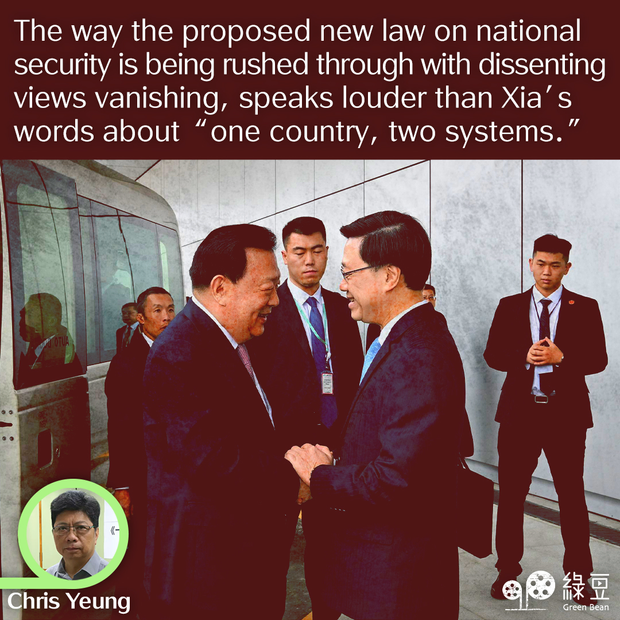Xia’s words face the reality test

Whether Hong Kong is over is anybody’s guess. Only time will tell. But if the jittery community is looking for hope and confidence from Beijing top official Xia Baolong in his weeklong visit to Hong Kong, they can be pardoned for feeling disappointed.
Xia, who heads the Hong Kong and Macau Affairs Office under the ruling communist party, was long in his words about the strengths of Hong Kong and the advantages it has – thanks to the “one country, two systems” policy. Action, he reportedly maintained, speaks louder than words.
Lee’s words
Wrapping up Xia’s visit after he left, Chief Executive John Lee quoted him as saying those who “bad-mouthed” the future of Hong Kong will not succeed simply by “bad-mouthing” the city.
Xia, Lee said, has used “facts and data” to show the city’s robust competitiveness, strengths and capability.
Reiterating Beijing’s full support for Hong Kong, he cited Beijing’s decision to add two more mainland cities, namely Xi’an and Qingdao, on the list of solo traveler schemes. “Director Xia has promised more preferential policies for Hong Kong will come.”
Lee went in length to repeat Xia’s pledges of helping Hong Kong, but short in giving details of what the preferential policies are, when they will be delivered and how they will help boost the city’s economy.
Allowing residents from Xi’an and Qingdao to visit Hong Kong on their own cannot possibly give a big boost to the city’s tourism and other related sectors.
The Culture, Sports and Tourism Bureau forecast Hong Kong can expect more tourists this year but they will be spending less per head, or an average of HK$5,800 on overnight stays, a 16 percent decrease from last year.
Xia’s action
Without substantive preferential policies to be delivered, Xia focused on talking up the fundamental strengths of Hong Kong as if he was the salesman of Hong Kong.
Xia gave a list of the city’s strengths including the legal system, stock market and proficiency of English. A pro-Beijing columnist wrote Xia had taken the lead to fight the public opinion battle by talking directly to targeted people and groups such as foreign business chambers.
It could not be more ironic that China’s top official in charge of Hong Kong affairs has come a long way from Beijing to the city to meet with people from different walks of life, in particular local and foreign business leaders, to boost confidence in the city’s future.
It was reminiscent of the meetings held by the then Beijing leaders for visiting Hong Kong business and community leaders in the 1980s that were aimed to allay their fears as the 1997 changeover was on the agenda.
Four decades on, Xia was desperate to reassure the populace and the international community that the policy of “one country, two systems” is the best guarantee of the city’s prosperity and stability.
This is despite the sea changes in Hong Kong since 1997, which have become more drastic after the 2019 social movement.
Back then, Beijing leaders’ assurance of keeping Hong Kong’s systems unchanged after 1997 had helped ease the anxieties of Hongkongers and investors. Many took a wait-and-see attitude.
This time, Xia faced a more skeptical audience who had seen more than enough the gap between the promises and reality of “one country, two systems” as surfaced in the past few years.
Consultation on Article 23
Prominent economist Stephen Roach, who said “It pains me to say Hong Kong is over” in a Financial Times article, is among the doubters of Beijing’s promise of giving Hong Kong autonomous powers to run their own affairs. He later said it was intended to be a “wake-up call” for the city.
His call may have come too late. As Xia said, action speaks louder than words. On the day he left Hong Kong, a one-month-long public consultation on Article 23 legislation came to an end. One day later, the Security Bureau said in a statement 98.64 percent of submissions received gave support, positive views on the proposed legislation.
The overwhelming support from those who responded, as the Government claimed, contrasts markedly with the doubts and criticism raised by certain local groups and foreign governments.
The way the proposed new law on national security is being rushed through with dissenting views vanishing, speaks louder than Xia’s words about “one country, two systems.”
▌[At Large] About the Author
Chris Yeung is a veteran journalist, a founder and chief writer of the now-disbanded CitizenNews; he now runs a daily news commentary channel on Youtube. He had formerly worked with the South China Morning Post and the Hong Kong Economic Journal.